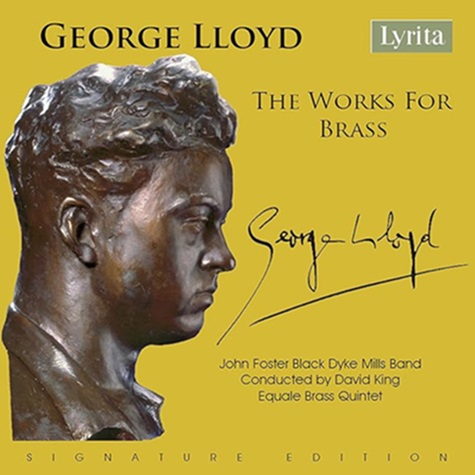

John Foster Black Dyke Mills Band
Conductor: David King
Equale Brass Quintet
John Wallace, John Miller, Michael Thompson, Peter Bassano, John Jenkins
Lyrita Recordings: LYRITA SRCD 425
Despite deep emotional anxieties that marked like fissures on his life, George Lloyd’s music retained a profound sense of honesty – heartfelt, distinctive and stubbornly melodic.
A wartime tragedy left him physically and psychologically scarred, the early years of compositional acclaim and national prominence replaced by a cycle of neglect and occasional recognition.
However, his musical creativity never left him. With the support of his wife and a life far from the pressures of London his health and artistic reputation were slowly rehabilitated. The last 20 years of his life (he died in 1998) were to be his most productive, fulfilling and successful.
Refinement and understanding
This amended re-release further adds to that; combining works recorded by Black Dyke in 1991 on the Albany label, set alongside an early composition from 1981 written for the Equale Brass Quintet (formed by trombonist Peter Bassano with colleagues from the Philharmonia Orchestra), recorded in 1984.
Both perform with refinement and understanding (helped by the fine production): Black Dyke beautifully balanced and cohesive in tempered interpretations by David King, Equale, subtle and cultured.
Both perform with refinement and understanding (helped by the fine production): Black Dyke beautifully balanced and cohesive in tempered interpretations by David King, Equale, subtle and cultured.
Although he did not write for the medium until 1984, Lloyd’s understanding of brass band orchestration and colour was complete – drawn from his youth in Cornwall to hearing John Ireland’s ‘Downland Suite’ at Crystal Palace and playing cornet in the Royal Marines.
Requiem
It makes ‘Royal Parks’, written for the 1985 European Championships such a startlingly authentic work.
Whilst the outer movements reflect the lightness and tonal mix of his ‘Tenth Symphony’ (scored for brass) it is the central ‘In Memoriam’ that sinks the deepest core of emotion.
Whilst the outer movements reflect the lightness and tonal mix of his ‘Tenth Symphony’ (scored for brass) it is the central ‘In Memoriam’ that sinks the deepest core of emotion.
According to his nephew, there was no doubt that it was not only a personal response to the death of bandsmen killed in the terrorist atrocity in Regent’s Park in 1982 (he heard the explosion), but a requiem to his own colleagues lost on board HMS Trinidad.
That link is recalled in the march originally written in 1941 (rescored for brass band in 1991), just a year before the catastrophic consequences. The rousing optimism of the music now echoes darkly with an unknowable hubris.
Spaciously conceived
‘Diversions on a Bass Theme’ (1986) is perhaps his most technically accomplished composition for the medium.
Reinvigorated by the interest generated by ‘Royal Parks’ it is a set of variations that grow organically from its opening bar, developed vividly and incessantly to its satisfying conclusion.
The masterful ‘English Heritage’ (1987) completes his contest trio (‘King’s Messenger’ was to come in 1993). It is a spaciously conceived tone poem, noble and elegant in its reflection of architectural grandeur and bucolic beauty – much like the golden works of Ireland, Howells, Holst and Bliss of his youth.
It is a spaciously conceived tone poem, noble and elegant in its reflection of architectural grandeur and bucolic beauty – much like the golden works of Ireland, Howells, Holst and Bliss of his youth.
Close to the surface
‘Evening Song’ (1991) acts as a musical counterbalance – a youthful reflection of a different kind. It expands on a simple tune with what appears to be a graceful, flowing melodicism, yet hidden below its deceptive complexities churn away.
That is also found in the brass quintet ‘A Miniature Triptych’ (1981), which in some way mirrors the emotional fractures of his life, the opening ‘Lost’ dark and troubling. ‘Searching’ that follows, is full of questioning motifs, resolved and unresolved, edgy and cautious.
It closes with an optimistic flourish in ‘Found’ – although one that starts in sombre reflection; Lloyd’s complex anxieties forever close to the surface.
Iwan Fox
To purchase: To be released on August 2nd
https://lyrita.co.uk/index.php
Play list:
1. Royal Parks (1984)
i. Dawn Flight
ii. In Memoriam
iii. Holidays
4. Diversions on a Bass Theme (1986)
5. Evening Song (1991)
6. HMS Trinidad (1941 arr. 1991)
7. English Heritage (1987)
i. Fanfare
ii. Largo
ii. Finale
10. A Miniature Triptych (1981)
i. Lost
ii. Searching
iii. Found









